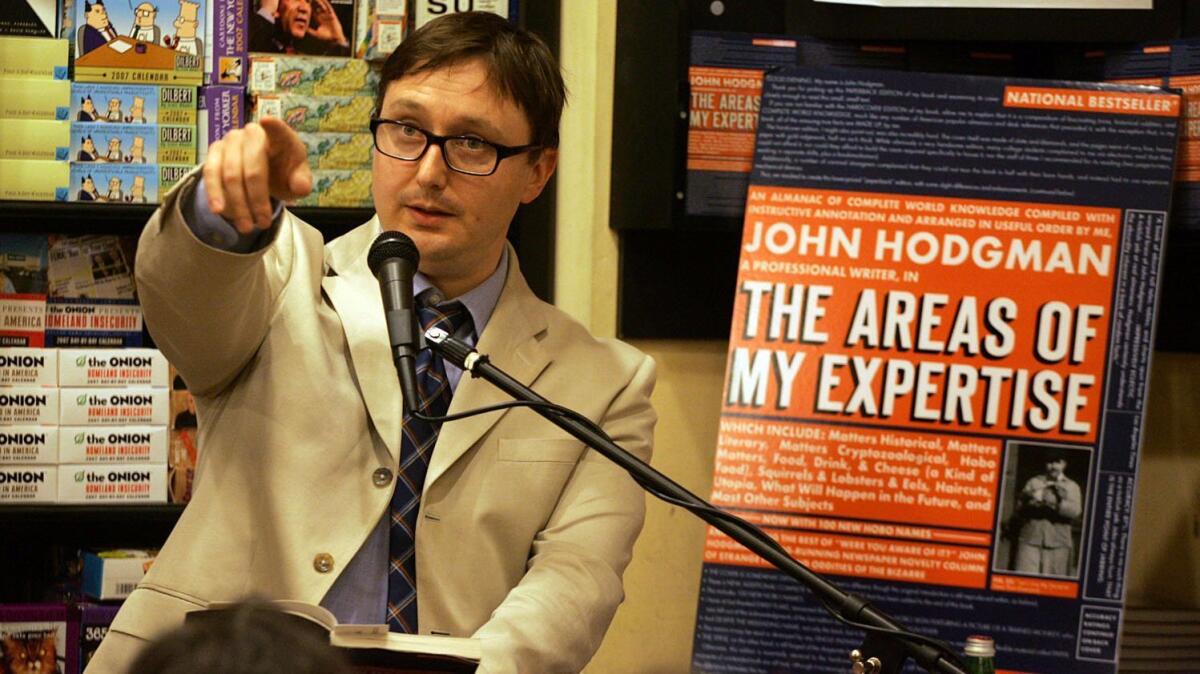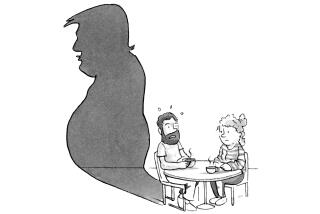The more-than-book-famous John Hodgman and his memoir ‘Vacationland’
“I only ever aspired to be book-famous. Once I got a little bit above book-famous, and got to almost semi-famous famous, the idea that I would fall back to book-famous was intolerable,” says John Hodgman with his trademark dry hyperbole. Then he pauses. “But in fact, that’s really where I belong.”
Before the comedian became a know-nothing know-it-all commentator on “The Daily Show,” before he declared “I’m a PC” in Apple’s television ads, Hodgman actually worked in publishing. He was a literary agent.
“Writing is really hard. It’s challenging and lonely. The reason I was a literary agent instead of a writer was that it was social, and less work,” he says with a smile.
He’s speaking with me via Skype from his home office in Brooklyn days before the launch of his fourth book, “Vacationland,” which is subtly behind him in the frame. After three books of satire such as “The Areas of My Expertise,” Hodgman has written his first memoir.

“I really enjoyed writing it, and I really felt at home, and at my most open and honest, while writing this book,” he says. It’s framed around two loci, his family’s house in western Massachusetts and their summer house in Maine, which allows him to riff on growing up, parenting and coming to grips with being in his 40s.
“The book is about the moments of clarity when all the illusions you tell yourself about who you are and what you represent fall away,” he says. “In my case, I realized I was a mid-40s white male monster staring down what I hope is the second half of my life and wondering what there is possibly for me to do.”
The ironic, arch Hodgman, the one with the fast wit and sharp way with language, is still there. But he’s ceding ground to a side of himself that’s warmer and reaching for something beyond the laugh. He continues: “There is always new and important work to do if you’re willing to face yourself honestly.”
Hodman was born and raised in Massachusetts. He was by any definition an odd teenager — “in high school I had long hair and I wore a fedora to school and a Dr. Who scarf and I carried a briefcase,” he admits. He went to Yale and studied literary theory, then moved to New York for the literary agent job. In “Vacationland” he mentions his wife — a teacher with an obsession about a certain unnamed writer’s property in Maine — but doesn’t detail their relationship, nor does he write about his children. Instead, he focuses on a bunch of funny stories about himself, and telling them well.
Hodgman’s process for writing the book was an unusual hybrid. Listen to his podcast — Judge John Hodgman, where as a self-designated “fake internet judge” he rules on disputes between pairs of listeners with the help of producer-slash-baliff Jesse Thorn — and you’ll hear him working out notions of bullying, or what to Marie Kondo out of your life. And then there’s the third thing, the live performances, which he eventually took on tour and from which the book takes its name. Those started out almost as a dare to himself.

“I decided to go down into the basement of a bar in Park Slope, Union Hall in Brooklyn, and just set a weekly deadline for myself to see what was still inside my head. I felt like I had nothing, having written a thousand pages of fake facts,” he explains, “but an audience and a deadline and panic are all good catalysts for creativity.”
More than once, Hodgman has experienced what seems like a setback only to have his career take on new dimensions. He loved doing the Apple ads with Justin Long, but the campaign ended in 2009. After that, he started the podcast. He hoped “Vacationland” would be a stand-up special, but it didn’t happen (one outlet told him they weren’t commissioning any specials from, as Hodgman puts it, “white dudes in their middle age.”)
“Once again I have to thank famous fame for abandoning me, because it was only then that I was like, what can I do next with this?,” he says. “And I thought, I will turn it into a book.”
“Sitting and writing the book was a profoundly rewarding creative experience,” he says. “In part because I was finally telling the truth about my life, and in part because the stories were honed and I was able to enlarge them, and in part because I was able to know myself better on the other side of it.”
I realized I was a mid-40s white male monster staring down what I hope is the second half of my life and wondering what there is possibly for me to do.
— John Hodgman
For someone like me who grew up in New England, reading the book is a particular pleasure — especially this October, when Los Angeles is sweltering instead of cooling off. Hodgman has a gift for capturing the modes and mores of New England in a way that is wry and true. Take, for example, his description of his friendship with performer Jonathan Coulton.
“Jonathan is a musician and my best friend,” he writes. “I hope he does not read that last part. I would never call him my ‘best friend’ to his face. I am from Massachusetts and he is from Connecticut, and New Englanders do not say things like that. ‘Yankee ingenuity’ means the canny improvised fixes, repairs, and craftwork our predecessors employed to keep their barns and brains intact through long winters without ever having to break down and ask anyone else for help. Shame, embarrassment, and crippling emotional reticence is what this part of our nation was founded on, at least the white part, and Jonathan and I adhere to this legacy.”
I felt a kinship with this — and it might not just have been regional. “We must be distantly related, you know,” Hodgman said the moment our call connected. “Because my middle name is Kellogg.” Indeed — we are probably more closely related to each other than to the breakfast cereal company Kellogg’s. New England is small and those family tree roots knot up fast.
But despite its New England resonance, it’s not really about the place. “I want people to understand that I talk a lot about Maine and about Massachusetts, but this is universal stuff and in a lot of ways they’re just metaphors for whatever place you happen to inhabit,” Hodgman says.
In that way, the picture he draws for us of his Maine neighbors or Perry’s Nut House on Route 1 or the swimming traditions of his western Massachusetts town are specific but also bigger. They share something about our weakness and prejudices and efforts (and failures) to connect.
It makes me think of “Prairie Home Companion,” so I ask, hesitatingly, “Would you hate me if I said you can do for New England what Garrison Keillor did for Minnesota?”
“Have you ever heard of the term ‘love-hate relationship’?” Hodgman replies. “Here are the answers. I would hate you, because it would reinforce the idea that ‘Vacationland’ is a regional book, when it is proudly universal, and I might even say multi-universal, because I am not against selling this book in other dimensions. I would love you because that would be entirely high praise if it were to come true, because Garrison Keillor is a hero of mine, even though comedically he’s become a little bit of a joke in certain sniffy comedy circles.”
Hodgman has appeared on “Prairie Home Companion” with the new host, Chris Thile, after Keillor’s departure. “He created a world that is a cosmos unto itself. So I hate you because you suggested that Garrison Keillor was a regional writer. But I love you just because we’re human beings and we have to be better to each other. So I’ll leave it on that.”
Whew. I’m relieved that I didn’t cause a lasting dispute with my many-times-removed long-lost cousin. Otherwise we might have wound up in his fake internet court.
More to Read
Sign up for our Book Club newsletter
Get the latest news, events and more from the Los Angeles Times Book Club, and help us get L.A. reading and talking.
You may occasionally receive promotional content from the Los Angeles Times.









